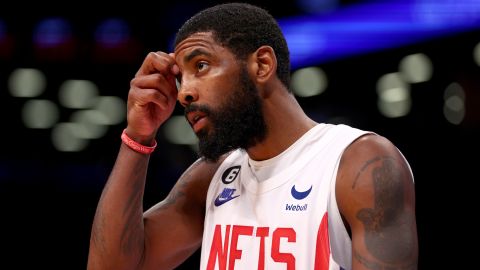[ad_1]
CNN
—
Brooklyn Nets star Kyrie Irving said that he is “not going to stand down on anything I believe in” after he was condemned by the owner of his NBA team for tweeting a link to a documentary deemed to be antisemitic.
The star guard tweeted a link Thursday to the 2018 movie “Hebrews to Negroes: Wake Up Black America,” which is based on Ronald Dalton’s book of the same name. Rolling Stone described the book and movie as “stuffed with antisemitic tropes.”
In a fraught post-game press conference after the Nets lost to the Indiana Pacers on Saturday, Irving defended his decision to post a link to the documentary.
“In terms of the backlash, we’re in 2022, history is not supposed to be hidden from anybody and I’m not a divisive person when it comes to religion, I embrace all walks of life,” he said.
“So the claims of antisemitism and who are the original chosen people of God and we go into these religious conversations and it’s a big no, no, I don’t live my life that way.”
Several organizations have condemned Irving’s tweet, including the Anti-Defamation League (ADL), the NBA, the Brooklyn Nets, and Nets’ owner Joe Tsai.
“I’m disappointed that Kyrie appears to support a film based on a book full of anti-semitic disinformation,” Nets owner Joe Tsai tweeted Friday night.
“I want to sit down and make sure he understands this is hurtful to all of us, and as a man of faith, it is wrong to promote hate based on race, ethnicity or religion.”
Tsai added, “This is bigger than basketball.”

Irving said in the press conference that he “respects what Joe [Tsai] said,” but claimed that he had not tweeted something harmful.
“Did I do anything illegal? Did I hurt anybody, did I harm anybody? Am I going out and saying that I hate one specific group of people?”
“It’s on Amazon, a public platform, whether you want to go watch it or not, is up to you,” Irving said. “There’s things being posted every day. I’m no different than the next human being, so don’t treat me any different.”
CNN has asked Amazon for comment but, at the time of publication, had not received a response.
At the same time, Irving acknowledged his “unique position” to influence his community, but said “what I post does not mean that I support everything that’s being said or everything that’s being done or I’m campaigning for anything.”
Jonathan Greenblatt, CEO of the Anti-Defamation League, in a tweet on Friday called Irving’s social media post “troubling.”
“The book and film he promotes trade in deeply #antisemitic themes, including those promoted by dangerous sects of the Black Hebrew Israelites movement. Irving should clarify now.”

The Nets also spoke out against the star guard’s tweet.
“The Brooklyn Nets strongly condemn and have no tolerance for the promotion of any form of hate speech,” the team said in a statement to CNN.
“We believe that in these situations, our first action must be open, honest dialogue. We thank those, including the ADL (Anti-Defamation League), who have been supportive during this time.”
The NBA issued a statement saying, “Hate speech of any kind is unacceptable and runs counter to the NBA’s values of equality, inclusion and respect.
“We believe we all have a role to play in ensuring such words or ideas, including antisemitic ones, are challenged and refuted and we will continue working with all members of the NBA community to ensure that everyone understands the impact of their words and actions.”
Rolling Stone, meanwhile, said the movie and book include ideas in line with some “extreme factions” within the Black Hebrew Israelite movement that have expressed antisemitic and other discriminatory sentiments.
During the press conference, Irving was also asked about his decision to share a video created by far-right talk show host and conspiracy theorist Alex Jones, who was recently ordered to pay nearly $1 billion in damages to Sandy Hook families for his lies about the massacre.
Irving clarified that he did not agree with Jones’ false claims that the Sandy Hook shooting was staged but stood by sharing Jones’ post in September “about secret societies in America of occults,” that Irving believed to be “true.”
[ad_2]
Source link



